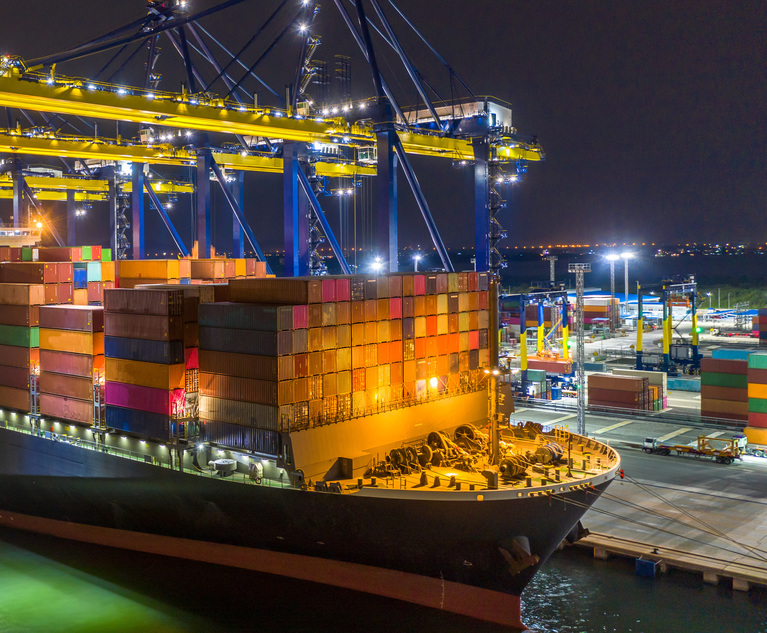 Credit: Kalyakan/Adobe Stock
Credit: Kalyakan/Adobe Stock Weaker Demand for Chinese Goods Spells Shipping Boom's End
U.S. container imports aren't falling off a cliff, but they're slowing down to more normal levels seen before COVID-19.
September 26, 2022 at 12:54 PM
6 minute read
The cost of shipping goods from China has slumped to the lowest level in more than two years as the world economy stumbles, dimming prospects for container carriers that turned in record profits during the pandemic.
A 40-foot shipping box from the world's largest port of Shanghai to Los Angeles fetched $3,779 last week, the first time the spot price was below $4,000 since September 2020 and half the level of three months ago, according to Drewry. More declines are expected in the next few weeks, it said.
While the value of Chinese exports was still rising through August, it's expected to continue to slow down. That's a symptom of multiple headwinds hitting developed and developing economies alike, from soaring inflation and a surging dollar to central bank interest-rate hikes and trade disruptions blamed on Russia's war in Ukraine.
"It's fair to say that the demand outlook for the trans-Pacific and container shipping generally is receding quickly," said Simon Heaney, a senior manager of container research at Drewry.
In what's typically the peak season for seaborne trade, global demand for Chinese goods is waning instead as consumers cut back spending because of inflation and the shift away from goods toward services.
Factories in Europe and the rest of Asia are also scaling back production. China's economic slowdown is also cutting into import demand, with companies in Asia and Europe seeing weaker growth or declines in orders from Chinese companies.
For the world's shipping lines, it's providing some relief to their packed sailing schedules yet threatening to slow an eye-popping run of profitability driven during the pandemic by stronger-than-normal consumer demand for household items.
"While it's more clear that the second quarter of 2022 will be an earnings peak, I think any talk of bust and return to pre-pandemic earnings levels — or lack thereof — is premature," said John McCown, an industry veteran and founder of Blue Alpha Capital.
Shares of Copenhagen-based A.P. Moller-Maersk A/S hit the lowest since March 2021 on Friday, and Germany's Hapag-Lloyd AG slumped to the lowest since June last year. Cosco Shipping Holdings Co., China's biggest carrier, reached a 17-month low. Shares of Honolulu-based Matson Inc., a smaller player that has operated an express Asia-to-U.S. service across the Pacific, are worth about half of their record high set in March.
It was just about two years ago that U.S. import demand started to surge, leading to a queue of cargo ships off the coast of Southern California through 2021 that eventually reached a high of 109 in January this year. As of Friday, the line to enter the ports of Los Angeles and Long Beach had eight vessels.
U.S. container imports aren't falling off a cliff, but they're slowing down to more normal levels seen before COVID-19.
The steady fall in spot container rates is putting pressure on carriers that have been pushing to sign more long-term contracts with customers as those prices soared into early 2022. Maersk, for instance, said recently it has about 72% of its long-haul volume on contracts.
Walmart Inc., Amazon.com Inc. and Ikea were among companies that signed contracts when spot prices were at near-record levels, according to analysis firm Xeneta, but as inflation bites importers in the U.S. and Europe want to ship fewer goods from Asia, it said.
Many of the carriers' customers want to renegotiate for discounts.
Agents and freight forwarders in Asia have received calls recently from cargo owners asking to lower their shipping costs, with some exporters complaining about the unfairness of paying almost twice as much on contracts than the spot market. Shipping companies want exporters to bulk up their volumes, but many are refusing to because of the weaker economic outlook.
"We polled customers and 50% of them successfully negotiated for lower rates on term contracts," said Peter Sand, chief analyst at Xeneta. "The drop in freight rates is due to falling demand globally, and port congestion has eased, allowing for more efficient operation of the ships."
Economists forecast the value of Chinese exports will grow 9% this year, down from the 13.5% expansion in the first eight months of the year and well below the 30% jump last year. While exports rose 7.1% in August from a year earlier, higher prices rather than a boost in volumes may be playing a bigger role in driving up the figures. About half of the headline export growth in July was due to price effects, according to an estimate by Macquarie Group Ltd.
Some of the softening in demand reflects an earlier-than-usual peak season for U.S. companies to import their wares. Historically, Chinese exports grow strongly into the second half of the year as companies in the U.S. and Europe stock up before the holiday season, but this year there was a big spike in shipments in May though July, which then fell back a bit in August.
Shanghai's port processed 8.4% less cargo in August than a year earlier, with the numbers of containers down 3.4%, the port said earlier this month. That tracks with the drop in boxes arriving in the U.S. The number of containers arriving at the busiest U.S. port of Los Angeles dropped by the most since the early days of the COVID-19 pandemic last month.
With no capacity to spare just six months ago, the container lines are now scrambling to reduce an excess of it to match demand. According to a Drewry report on Friday, 117 out of 744 sailings were canceled over the next month on major trade lanes, and about 68% of those blanked voyages were scheduled to do transpacific eastbound trips.
The weakening outlook isn't coming just from mainland China. Taiwan's exports grew at the slowest pace in more than two years in August, while South Korean exports dropped 8.7% in the first 20 days of this month.
Bloomberg Intelligence logistics analyst Lee Klaskow said the shipping industry still could have its third-best year in 2023, but the good times may not keep rolling beyond that given all the new ships — ordered during this period of prosperity — that will start to be launched next year.
"There is a lot of new capacity hitting the water in 2023, which will dampen spot and contractual rates," he said. "When we get to 2024, things may get worse for liners as more supply hits the water and supply chains normalize."
NOT FOR REPRINT
© 2025 ALM Global, LLC, All Rights Reserved. Request academic re-use from www.copyright.com. All other uses, submit a request to [email protected]. For more information visit Asset & Logo Licensing.
You Might Like
View All

U.S. Eleventh Circuit Remands Helms-Burton Trafficking Case Involving Confiscated Cuban Port
3 minute read
Blank Rome Adds 4 From Akerman in Second 2024 White Collar Group Hire
4 minute read
Florida Ports Get Cargo Traffic Boost, See Cruise Rebound
Law Firms Mentioned
Trending Stories
- 1Departing Attorneys Sue Their Former Law Firm
- 2Pa. High Court: Concrete Proof Not Needed to Weigh Grounds for Preliminary Injunction Order
- 3'Something Else Is Coming': DOGE Established, but With Limited Scope
- 4Polsinelli Picks Up Corporate Health Care Partner From Greenberg Traurig in LA
- 5Kirkland Lands in Phila., but Rate Pressure May Limit the High-Flying Firm's Growth Prospects
Who Got The Work
J. Brugh Lower of Gibbons has entered an appearance for industrial equipment supplier Devco Corporation in a pending trademark infringement lawsuit. The suit, accusing the defendant of selling knock-off Graco products, was filed Dec. 18 in New Jersey District Court by Rivkin Radler on behalf of Graco Inc. and Graco Minnesota. The case, assigned to U.S. District Judge Zahid N. Quraishi, is 3:24-cv-11294, Graco Inc. et al v. Devco Corporation.
Who Got The Work
Rebecca Maller-Stein and Kent A. Yalowitz of Arnold & Porter Kaye Scholer have entered their appearances for Hanaco Venture Capital and its executives, Lior Prosor and David Frankel, in a pending securities lawsuit. The action, filed on Dec. 24 in New York Southern District Court by Zell, Aron & Co. on behalf of Goldeneye Advisors, accuses the defendants of negligently and fraudulently managing the plaintiff's $1 million investment. The case, assigned to U.S. District Judge Vernon S. Broderick, is 1:24-cv-09918, Goldeneye Advisors, LLC v. Hanaco Venture Capital, Ltd. et al.
Who Got The Work
Attorneys from A&O Shearman has stepped in as defense counsel for Toronto-Dominion Bank and other defendants in a pending securities class action. The suit, filed Dec. 11 in New York Southern District Court by Bleichmar Fonti & Auld, accuses the defendants of concealing the bank's 'pervasive' deficiencies in regards to its compliance with the Bank Secrecy Act and the quality of its anti-money laundering controls. The case, assigned to U.S. District Judge Arun Subramanian, is 1:24-cv-09445, Gonzalez v. The Toronto-Dominion Bank et al.
Who Got The Work
Crown Castle International, a Pennsylvania company providing shared communications infrastructure, has turned to Luke D. Wolf of Gordon Rees Scully Mansukhani to fend off a pending breach-of-contract lawsuit. The court action, filed Nov. 25 in Michigan Eastern District Court by Hooper Hathaway PC on behalf of The Town Residences LLC, accuses Crown Castle of failing to transfer approximately $30,000 in utility payments from T-Mobile in breach of a roof-top lease and assignment agreement. The case, assigned to U.S. District Judge Susan K. Declercq, is 2:24-cv-13131, The Town Residences LLC v. T-Mobile US, Inc. et al.
Who Got The Work
Wilfred P. Coronato and Daniel M. Schwartz of McCarter & English have stepped in as defense counsel to Electrolux Home Products Inc. in a pending product liability lawsuit. The court action, filed Nov. 26 in New York Eastern District Court by Poulos Lopiccolo PC and Nagel Rice LLP on behalf of David Stern, alleges that the defendant's refrigerators’ drawers and shelving repeatedly break and fall apart within months after purchase. The case, assigned to U.S. District Judge Joan M. Azrack, is 2:24-cv-08204, Stern v. Electrolux Home Products, Inc.
Featured Firms
Law Offices of Gary Martin Hays & Associates, P.C.
(470) 294-1674
Law Offices of Mark E. Salomone
(857) 444-6468
Smith & Hassler
(713) 739-1250






